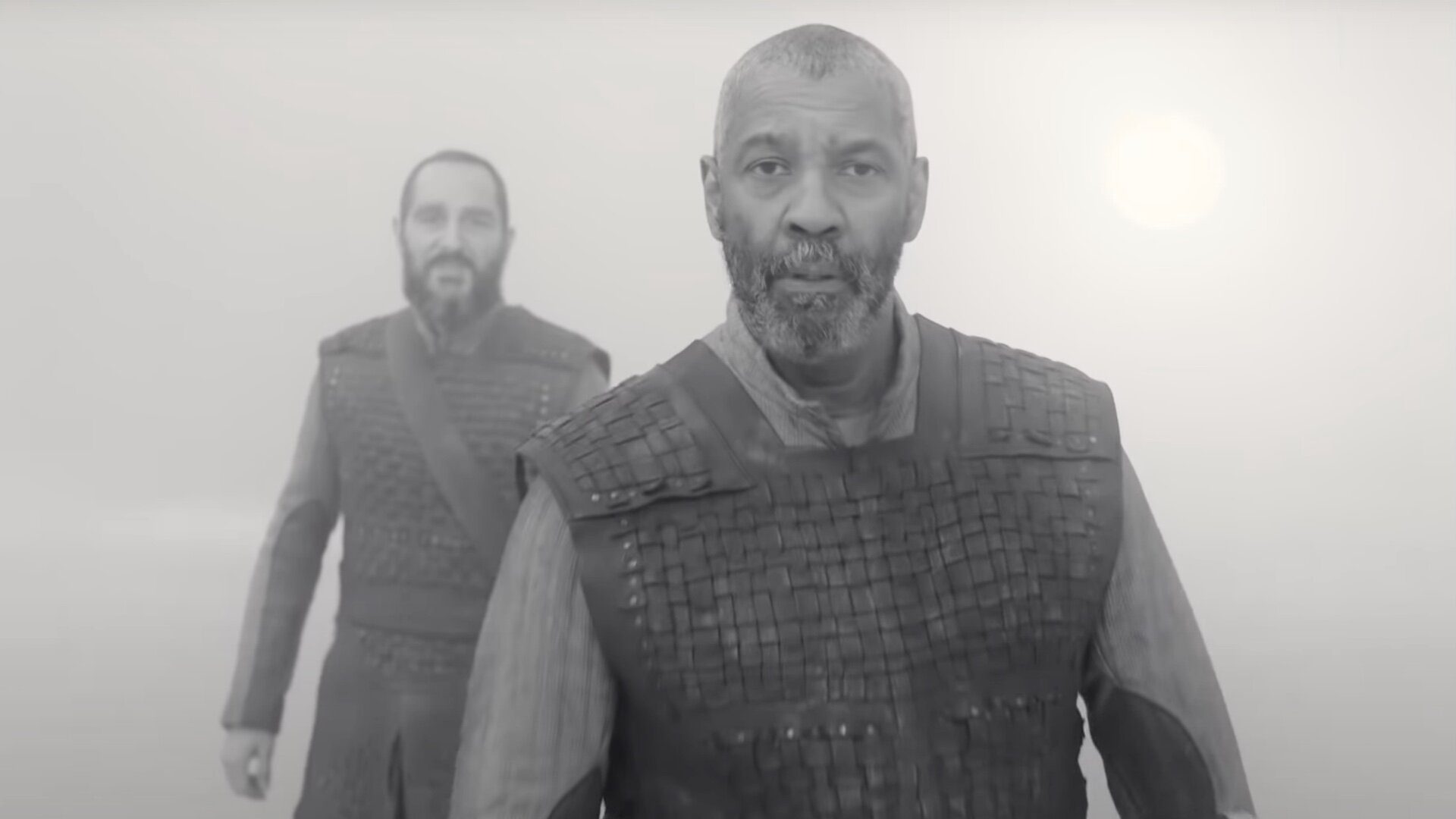Who needs another version of Macbeth on film? You may find yourself asking this question with the release of director Joel Coen’s The Tragedy of Macbeth, which stars Denzel Washington in the title role and, in the part of Lady Macbeth, Coen’s seemingly ubiquitous wife, three-time Academy Award winner Frances McDormand.
The story has been put on film with astonishing frequency. So you may wonder about this even if you’ve heard that the latest one is superlative. A movie of Macbeth is only a slightly more novel idea than a film about a cop in conflict with his uptight, by-the-book superiors.
Even in the silent film era, there were multiple screen versions. One featured Herbert Beerbohm Tree—by most accounts the greatest stage actor of the Edwardian Age. Among the more famous talking-picture-era takes are the 1948 version that starred and was directed by Orson Welles, at least two British renditions with Maurice Evans and Judith Anderson, a 1971 Roman Polanski account starring Jon Finch, and Trevor Nunn’s famed 1979 Royal Shakespeare Company (RSC) presentation with Ian McKellen and Judi Dench. On YouTube you can find Sean Connery’s 1961 Canadian Broadcasting Company rendering (pre-Dr. No) as well as his son Jason’s 1997 feature. There are also readily available versions with such acknowledged Shakespeareans as Anthony Sher, Eric Porter, Jeremy Brett, Nicol Williamson, and Patrick Stewart. Just five years ago a handsome account with X-Men actor Michael Fassbender and La Vie En Rose star Marion Cotillard was released into theaters, and this is to say nothing of the countless adaptations that have dispensed with Shakespeare’s verse. That includes movies like Scotland, PA and two versions in the Malayalam language, the tongue of the Indian state of Kerala. Perhaps most famously of all, there is Akira Kurosawa’s Japanese interpretation, Throne of Blood, starring the great Toshiro Mifune. There is even an old episode of The Rockford Files loosely patterned upon it.
Spurring this surfeit is the titular role. The more completely and subtly a dramatic character is written, the harder, generally speaking, it is to perform. Thus, any hack performer can effectively take on a part in a work by Sam Shepard, but few actors can do justice to Lear or Brutus. Hamlet and Richard III are comparatively easier because they are less contradictory: less life-like and more expressly figures of and for the stage.
The hardest of all the parts in the standard theater repertory may indeed be the Scottish usurper. Consider that it requires an actor who is as natural as a hero as he is as a villain. That’s because there is no tragedy without the seeming magnanimity projected by a genuine leading man, yet he must also be capable of menace, otherwise, the actor cannot be persuasive as the tyrant Macbeth becomes. Alongside this, he must have a palpable intelligence, one that will put across a figure who has exceptional depths. Yet, even so, the actor must be able to suggest someone who is notably lacking in self-awareness. On top of this, he must have the physical presence and bearing of a great athlete. As a famous tragedian who has struggled with the role once put it, the performer has to have the manner of a likeable but dim hockey star who just happens on occasion to be a soulful philosophical genius with more than a touch of the poet.
This is immensely tempting, of course. It’s a supreme test, and the layers and paradoxes in Shakespeare’s characterization make the part irresistible for actors eager to prove themselves. That the play is the shortest of all Shakespeare’s tragedies makes it almost equally appealing for film directors. This attraction is bolstered by its abundance of action scenes and wealth of mayhem and gore.
But all the requirements of the part mean that most actors who take it on fail miserably. It’s hard to say which is worse in the Welles’s version: his acting or the dime store costumes that look like rejects from Abbott and Costello Go to Mars. Likewise, as memorable as Trevor Nunn’s RSC version is, McKellen is wrong for the part. At no time do you believe he is a great warrior or might under other circumstances have been an honorable man. To the same extent Jeremy Brett seemed about as much like a noble swordsman as Richard Simmons, and Nicol Williamson essayed the part with as much poetry as you might expect of Rob Gronkowski.
Nor do most directors have a proper understanding of the play. Polanski’s Macbeth is precisely what you would expect from the director of Rosemary’s Baby, and while Sean Connery was exceptional in the role—arguably more convincing than any other actor to play it on film—the telecast in which he starred is about as subtly directed as an episode of Married with Children, if with cheaper sets and worse lighting.
So the pairing of Washington and McDormand and the inclusion of Coen as director is welcome. Those who have seen Washington onstage know how gifted he is, and he happens to be endowed with more than a few of the traits the role calls for. A sometime college basketball player, he has the stature and the confidence required, along with a certain mix of leading man charm and obvious fallibility. McDormand is every bit as good as you might expect, and Coen’s direction is inspired.
Joel Coen’s decision to cast a black actor should not give viewers any discomfiture. At this point “nontraditional” casting has become traditional. You rarely see a stage or screen version of Shakespeare that doesn’t have mixed-race casting, and, as Shakespeare’s language is so contrary to the way we actually speak, no one should object to seeing Asian or African American performers in his plays. He was aiming, after all, for psychological truth and storytelling, not naturalism or realism. Moreover, the director has purposefully made use of costumes and sets that suggest an earlier period but that are not specifically of any place or era. So The Tragedy of Macbeth doesn’t awaken the jarring sense of incongruity that nontraditional casting produced in such recent movies as Armando Iannucci’s 2019 remake of David Copperfield, which starred the Indian actor Dev Patel.
I suspect, in fact, that audiences will have more trouble with Washington’s age than his skin color. This production of Macbeth works against the common view of the play: that it’s the story of a rising man who is putty in the hands of his sexy young wife. In this version, the hero and his beloved are making a last bid for power with their best days already behind them. Yet the performances and the presentation are so compelling that these choices seem not only compelling but plausible.
I confess that I disliked some of the earlier Coen brothers movies because they seemed to me too busily shot and staged: too fussy. (Think especially of Raising Arizona and The Hudsucker Proxy.) But Coen is 67 now, and what he has said in interviews is consistent with what appears on screen. The Tragedy of Macbeth was deliberately shot to use the play’s theatricality and not to turn it into a widescreen David Lean–style spectacle or crowd it up with clever camera angles. By wisely shooting the film in a moody black and white, Coen makes you listen to the text and the actors, not upstaging Shakespeare. At the same time, his direction is anything but unduly reverential.
This is not a Merchant-Ivory picture.
Recognizing that the story has many elements of horror and of the supernatural, Coen decided on a visual approach that incorporates elements of German expressionism. The result is a look that is stark, bold, and striking—at times almost avant-garde. (It’s hard to believe that he wasn’t partly influenced by the offbeat and disturbing 1971 Peter Brook film of King Lear that starred Paul Scofield.) The movie’s pictorial language and style are matched by composer Carter Burwell’s unsettling score. While hinting at traditional Scottish fiddle playing, it’s also in the spirit of the more unnerving film work of Bernard Hermann: melodic one moment, eerie and purposefully repetitive the next.
The secondary players are mostly excellent, too. Brendan Gleeson is a virile and compelling Duncan, and Bertie Carvel is an unforgettable Banquo. Even the small players manage to stand out with particularly excellent performances turning up from Jefferson Mays as Lady Macbeth’s physician and Moses Ingram as Lady Macduff.
Those looking for an exact rendering of the text should be forewarned, however. Small changes abound. In this version, the role of Ross has been built up, and an assortment of cuts have been made. When Malcolm and Macduff meet in England, there is no longer any effort by Malcolm to test Macduff’s loyalty, and Ross becomes the savior of Banquo’s son Fleance. The trimming contributes to a remarkable brevity as the movie clocks in at a tidy one hour forty-five minutes.
I have seen at least half a dozen different stage productions of Macbeth and many more film versions. This is by far the best. In my career as a playwright, I have twice had actresses literally break their legs before opening night. This has made me question many of the superstitions of the theater. But there’s no doubt that it’s hard to do the “Scottish play”—as it’s often referred to—well. Coen, Washington, and McDormand deserve great credit for their achievement.

